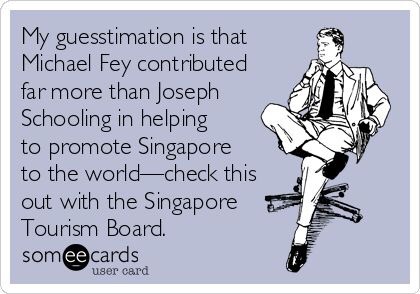Slightly more than a year before Singapore won its first gold medal at the 2016 Summer Olympics, I tweeted that “Joseph Schooling’s golds at the SEA Games looks like Barcelona or Manchester United, winning the Singapore’s S-league. #swimming” (@SingaporeLite on June 11, 2015).
From 4-Year Games to 4D Gambling
On August 13, 2016, within an hour of Joseph Schooling’s historic feat for winning Singapore its first gold at the Rio Olympics, punters in Singapore were lining up outside betting outlets islandwide to leverage on his Olympic record-breaking time of 50.39sec in the Men’s 100m butterfly. Who says that medalists’ record times can’t numerologically be used to divine the next winning lottery numbers?
A Grade 9 Singapore Math Question: “How many possible 4D numbers (with and without repetitions) could punters choose from Joseph Isaac Schooling’s winning time of 50.39 seconds?”
The Olympicology of Schooling
Following the mania among superstitious punters to strike it big, I coined Olympiocology to poke fun at their irrational or paranormal behaviors.

On the same day, I also tweeted: “How can Singapore experience the Schooling Effect in the aftermath of winning its first gold medal?” with a link that opens up the DIY e-card below.

Sports Awards First, Military Service Second
Three days later, @Zero_Math, I texted: “Military rules are man-made—not cast in stone. How many Joseph Schooling’s and Fandi Ahmad’s does Singapore have?,” accompanied by the following e-card:

A Tale of Two Promoters: Vandal & Victor
On August 16, 2016, I also tweeted tongue-in-cheek another DIY e-card, comparing the notorious Michael Fey (the American teenager who was caned for vandalism in Singapore) and the glorious Joseph Schooling (whom some “bigoted” locals or Trump “patriots” claimed not to be a “true-blue Singaporean”).

Mathletes & Olympians: Mental v. Physical
Which is harder for most countries to produce: a gold medalist at the International Mathematical Olympiad (IMO) or at the Olympic Games?
Although differentiating mathletes and olympians might look like comparing apples with oranges, however, for a number of developed countries, it appears that the chances of their athletes bringing in an Olympic gold medal home are higher than the odds of their IMO mathletes being a gold medalist, if some of their representatives aren’t foreign-born, or if they were to rely solely on their limited pool of local talents.
Below is another e-card I produced in the aftermath of Singapore’s first ever-win of a gold medal at the Olympics.

A Guesstimation Question: In a number of highly competitive events at the Olympic Games, where victory is determined by mini-seconds or centimeters, and if winning a gold medal is arguably “60% skill, 40% luck,” or “50% talent, 50% luck,” guesstimate what percentage of gold medalists make it by pure luck rather than by sheer skill.
Count on Me, Singapore!
Can Singapore still count on Joseph Schooling for more medals? Would he prove his critics or detractors wrong in making his country proud again? What are the chances that he’d “make Singapore great(er) again”?
Let’s wish him all the best in the next phase of his swimming career! Let no one take away what he did to make Singapore and Singaporeans proud.
2016: Singapore & Schooling: 🏊 🇸🇬 🥇
2020: Singapore & (Kimberly Lim and Cecilia Low): ⛵️ 🇸🇬 [🏅?]
Bibliography & References
Commentary: Singapore sports must learn lessons from Schooling’s decline
https://www.todayonline.com/node/12067716
President Halimah, govt leaders speak up against ‘negative, hurtful’ comments on Joseph Schooling’s Olympics performance
https://www.todayonline.com/node/12062406
‘It’s hard to swallow’: Joseph Schooling disappointed by butterfly performance at Olympics, vows to fight harder
https://www.todayonline.com/node/12056111
Golden ticket 5039 sold out after Schooling’s win http://www.todayonline.com/node/2318881
© Yan Kow Cheong, July 31, 2021.

